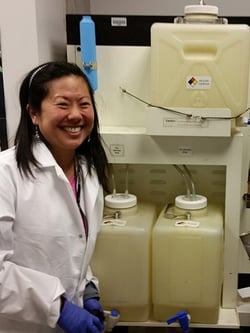
The Chemistry Department at the University of Colorado Denver is now recycling waste acetone that is generated in teaching laboratories.
Through conversations between the Chemistry Department and the university’s Department of Environmental Health and Safety (EHS), it was discovered that the teaching labs at CU Denver could greatly benefit from reusing their waste acetone.
EHS realized its recycler, which was infrequently used, would be an endless resource at CU Denver; so EHS donated the recycler to the Chemistry Department.
The recycler was previously located at the CU Anschutz Medical Campus but was underutilized because researchers there usually require very pure chemicals for their work.
“While safety is the primary mission of EHS, we also care greatly about sustainability,” said Ethan Carter, PhD, director of EHS. “Re-homing our solvent recycler to the Chemistry Department where it would have a greater impact was an easy decision.”
The recycler is a better fit for teaching labs because they use large amounts of acetone to wash glassware, as solvent for cooling baths, and even as reagents, all of which require extremely high precision. Students in the teaching labs collect their acetone waste stream from their experiments and instead of disposing of it as waste, it is recycled and reused in the same labs.
Since January, Pam Nagafuji, Organic Chemistry lab coordinator, has recycled 260 liters of waste acetone, saving the department over $700.
“We used to purchase about 15, 20-liter containers of acetone per semester, but with the acetone generated from the recycler we have only needed to purchase two containers this entire semester” says Cathy Rathbun, General Chemistry lab coordinator.
Rathbun and Nagafuji project future yearly savings from using the recycler at upwards of $1,500 per year. This is just one example of how the university is trying to make chemistry more environmentally friendly, says Nagafuji. “Recycling acetone diverts hazardous waste, is cost effective and is part of our green chemistry practice,” she says. “Other examples are consideration of atom economy and the use of solvent free reactions in our lab experiments.”
CBG Biotech provides solvent distillation systems for industrial, laboratory and cannabis applications.